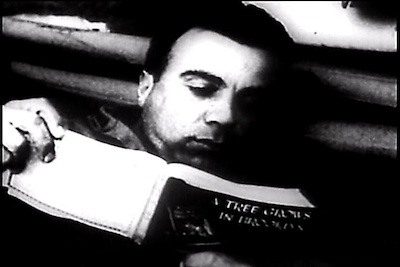
(Image Credit: Jay Voss)
Please note, the opinions expressed herein are solely those of viz. blog, and are not the product of the Harry Ransom Center.
Forever Amber was the best-selling book in 1940s America, selling over three million copies during the decade (Guttridge). In many ways, the scope of the work recalls Thackeray’s The Luck of Barry Lyndon. Written by Kathleen Winsor and set in seventeenth-century England, Forever Amber is the tale of Amber St. Clare, who climbs the ranks of British society by marrying (or sometimes just sleeping with) wealthier and wealthier men. The book was subject to vehement censorship, even though (or perhaps in spite of) a market demand that surely tested the durability of the Macmillan Company’s printing operation. Interestingly enough, as part of their Banned, Burned, Seized, and Censored exhibit, the Harry Ransom Center is showing an Armed Services Edition of Forever Amber.
Armed Service Editions were small, pocket-sized editions of books produced for US servicemen to carry in their pockets throughout the battlefields of World War II. The Armed Service Editions represented an array of genres, from classics to popular fiction, from biographies to poetry. This only seems right. American servicemen were crossing an ocean to battle fascists intent on burning any book that did not correspond with their ideology. It’s fitting that our troops would be armed with, well…books.

(Image Credit: Wikipedia)
One can see from the cover of the America Service Editions edition, the work puports to be “CONDENSED FOR WARTIME READING.” Most, but not all, of this truncation was part of a censorship project. This censorship was surely meant to conform with the polite tastes of the period. (When the book was banned in the state of Massachusetts, the state’s attorney general cited 70 references to sexual intercourse, 39 illegitimate pregnancies, 7 abortions, and numerous descriptions of women declothing in front of men (Guttridge)). It’s hard to doubt that soldiers risking life and limb for country would have minded these passages too much. Perhaps they were just grateful for truncated entertainment, anything to take their mind off the horrors of war. But the Armed Services Edition of Forever Amber does raise some pertinent questions: Is it better for a society to censor entertainment from the get-go than publish a variety of things and burn them later? What’s the difference?
Guttridge, Peter. “Obituary: Kathleen Winsor: Author of the Racy Bestseller Forever Amber,” The Independent 29 May 2003: 20. Print.
Recent comments
2 years 29 weeks ago
2 years 44 weeks ago
2 years 44 weeks ago
2 years 50 weeks ago
3 years 4 weeks ago
3 years 4 weeks ago
3 years 4 weeks ago
3 years 6 weeks ago
3 years 6 weeks ago
3 years 6 weeks ago